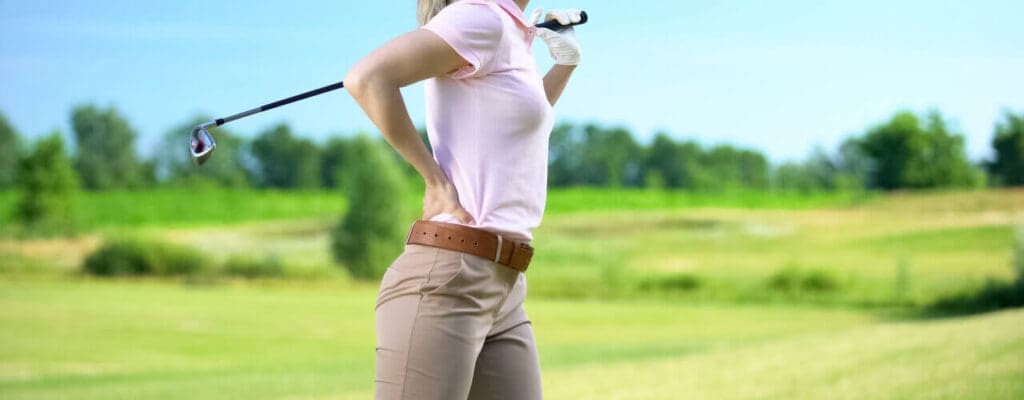Golf Injuries: Play It Like A Champion With These Tips

Are you concerned about an old injury that seems to pop up every golf season? Have you wondered what to do to get ready for golf this year? At Agility Physical Therapy, our physical therapists are highly trained movement experts. We can help determine any limitations or restrictions affecting your swing and/or causing pain.
Golf is a sport that can be played by people of all ages, both male and female, and by varying degrees of ability and experience. Most golf injuries are overuse-type conditions, often due to poor swing mechanics, poor core strength, and/or improper warm-up.
Our physical therapists are experienced at caring for golfers and helping resolve injuries, old and new. We understand the mechanics of golf swing and the specific demands on individual joints, soft tissue, and your body as a whole.
Request an appointment at Agility Physical Therapy & Sports Performance, LLC today and let one of our physical therapists assess how your body moves and teach you how to resolve any issue standing in your way of getting out on the course again!
Table of Contents
ToggleMost common injuries in golf
Whether you are a skilled golfer with a low handicap or a new golfer still trying to hit the ball every time, the most common injuries are similar in the body location. The differences tend to be seen in the percentage of injury at each site.
Although often considered a leisurely activity, golf requires considerable coordination and force generation, resulting in injury. The most common type of injury is overuse due to the total repetition of swings and, even worse, poor technique.
The most common injuries in golf occur in the following regions of the body:
- Lower back: Improper swing technique is one of the leading causes of lower back pain among golfers. Swinging too forcefully and/or with too much or too little motion can lead to muscle strains and abnormal pressure on the spine’s discs.
- Neck: New golfers, in particular, are not used to twisting their bodies as far or as often as a round of golf requires. Although the head should stay relatively still while swinging, the movement of the rest of the spine causes rotation of the neck from the bottom up instead of our usual top-down sensation.
You can sometimes avoid neck pain/ injuries by first warming up properly, taking frequent breaks, starting with fewer holes in the beginning, and slowly working up to more extended periods of practice and play. - Shoulder: Shoulder pain/injury can occur at any phase of the golf swing but tend to be due to faulty swings, a traumatic force like hitting a root or rock, taking a deep divot, and/or fatigue/overuse.
Golfers typically develop problems with their tendons (i.e., rotator cuff muscles) or arthritic joint changes. Fortunately, most injuries respond to physical therapy intervention. - Elbow: Golfer’s elbow is a common issue for golfers. It is a form of tendinopathy that causes inflammation or micro-tearing in the tendons surrounding your elbow’s inner aspect. This condition is often the result of repetitive gripping and/or swinging and may be related to grip on the club handle. This condition can make holding and swinging a club impossible.
- Hip: The hip joint typically has a lot of mobility and can withstand large forces. The hip is subjected to repeated stresses during the golf swing and is particularly vulnerable to injury.
Due to the extreme rotational and shear forces, injuries such as groin strains and joint sprains are common. Improper swing mechanics can leave you vulnerable to injuries to the cartilage and muscles in the joint itself. - Knee: Knee pain is one of the most common types of injuries in the lower body of a golfer. The most common type of knee injury amongst golfers is a meniscal tear. This injury may be caused by sudden, forceful, twisting motions while bearing weight through the knee.
At Agility Physical Therapy, our physical therapists thoroughly understand movement and, specifically, golf swing biomechanics. We use our expertise in the musculoskeletal system to identify and manage golf injuries. Our goal is to help you recover from an injury and improve your overall movement and strength to get back on the course doing what you love!
What to expect at your physical therapy sessions
Most golf-related injuries result from overuse and/or poor swing mechanics. Our team understands the biomechanics and forces of the golf swing to diagnose and treat any musculoskeletal injury.
We will conduct a comprehensive evaluation on your first visit, including a thorough history and movement assessment. We will identify your unique joint range of motion and how your joints move in relation to one another. In addition, we will test your strength, coordination, and balance to ensure we determine any weaknesses and/or limitations that may impair your ability to swing correctly.
This information will help us design a program tailored to your individual needs. Our programs consist of flexibility/mobility exercises, strength and power training, and corrections of faulty movement patterns to help the golfer reduce the likelihood of injury and improve their overall performance.
Our team will show you warm-up routines and in-season and/or preseason strength and conditioning programs that include education on enhancing performance so you can hit the ball with greater confidence!
Request an appointment at Agility Physical Therapy & Sports Performance, LLC today!
At Agility Physical Therapy, our physical therapists will design a golf-specific plan to help you find relief and protect your body from future injuries and pain. No matter what condition you are dealing with, we can help you golf pain-free! Contact us now!
Sources:
- https://journals.lww.com/jgpt/fulltext/2005/12000/optimizing_the_benefits_versus_risks_of_golf.4.aspx
- https://journals.sagepub.com/doi/abs/10.1177/0363546504267346
- https://www.scielo.br/j/rbfis/a/qGqt8m5GKpc8HtkqT5Wnzmg/abstract/?lang=en
- https://www.ncbi.nlm.nih.gov/pmc/articles/PMC3735827/
- https://www.ncbi.nlm.nih.gov/pmc/articles/PMC6088115/
